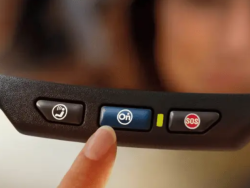
—
General Motors alleges a 627-page OnStar lawsuit is a “scattershot” class action that includes 1,993 paragraphs asserting 65 separate counts brought by 47 named plaintiffs in 27 states.
But GM argues the “claims and theories are unclear or lack merit.”
Problems began for GM and OnStar when the New York Times reported how the features caused insurance rates to increase for some drivers.
In addition, the Federal Trade Commission accused GM and OnStar of selling driver data to third-party companies which increased insurance rates.
General Motors owners and their lawyers jumped on the bandwagon and filed more than 20 class action lawsuits against GM, OnStar and other companies. Those lawsuits were consolidated into litigation titled, “IN RE: Consumer Vehicle Driving Data Tracking Litigation.”
The plaintiffs contend their “Driving Data has tangible value,” but GM and OnStar caused the plaintiffs to “los[e] control over the use of [their] Driving Data.” Additionally, GM’s “actions of secretly intercepting, using, and disclosing Driving Data invaded privacy rights.”
The plaintiffs also claim they suffer from “emotional distress and mental anguish” and “economic harm stemming from GM’s exploitation of their Driving Data.”
According to the class action lawsuit, “driving data” include:
“[G]eolocation, route history, driving schedule, fuel or charging levels, hard braking events, hard acceleration events, tailgating, time spent idle, speeds over 80 miles per hour, vehicle speed, average speed, late night driving, [and] driver attention.”
The General Motors OnStar system offers a program called Smart Driver which GM says is “designed to encourage safe driving skills by collecting certain driving data, such as hard braking.”
But according to the lawsuit, 2014-2024 vehicles are “corporate surveillance machines” that invade the driver’s privacy.
GM OnStar Lawsuit Update
General Motors says OnStar customers could separately enroll in Smart Driver and if they did, the customers were informed “information on driving events” would be collected, including “Hard Braking,” “Hard Acceleration,” “Distance Driven, [and] Late Night Driving.”
GM argues privacy allegations don’t hold up because GM’s collection of driving data was disclosed and consented to by drivers, and because driving a vehicle involves conduct that takes place on public roads which “cannot form the basis for any privacy-based claim.”
General Motors also alleges the Wiretap Act claims are defective because operating a vehicle does not result in a “communication” with “contents,” and GM allegedly did not “intercept” any such communications. According to GM, it was a party to these electronic transmissions and a party cannot “intercept” a communication to itself.
The automaker also argues common-law and state consumer statute claims must be dismissed because these claims are barred by the Fair Credit Reporting Act.
Invasion of privacy claims allegedly fail and must be dismissed because the plaintiffs are not “in seclusion” while they are driving in public, and collection of customer data is allegedly not a “highly offensive” intrusion. Additionally, GM says its disclosure of driving data “was not made to the public at large.”
The judge should also allegedly reject state statutory claims under the laws of states in which no named plaintiff resides. And the automaker argues there is a difference between General Motors and its dealerships.
“Plaintiffs do not plead any particular pre-purchase communications they had with GM during which GM made misrepresentations. Instead, they rely on the allegedly deceptive conduct of independent dealers, which cannot be attributed to GM.” — General Motors
And GM also claims such as “loss of privacy” and “unauthorized dissemination” of data “are not actionable for the claims for which they are alleged. The only economic injury Plaintiffs point to—increased insurance premiums or denials—lacks a sufficient causal connection to GM’s alleged conduct.”
The GM OnStar lawsuit was filed in the U.S. District Court for the Northern District of Georgia (Atlanta Division): IN RE: Consumer Vehicle Driving Data Tracking Litigation, MDL No. 3115, Case 1:24-md-03115-TWT.
General Motors OnStar Lawsuits
- Case 1:24-cv-02510 — Dinardo v. General Motors LLC et al
- Case 1:24-cv-02516 — Reed et al v. General Motors LLC et al
- Case 1:24-cv-02517 — Block et al v. General Motors, LLC et al
- Case 1:24-cv-02518 — Chicco v. General Motors LLC et al
- Case 1:24-cv-02553 — King et al v. General Motors LLC et al
- Case 1:24-cv-02565 — Clingerman et al v. General Motors LLC et al
- Case 1:24-cv-02574 — Alamorian v. General Motors LLC et al
- Case 1:24-cv-02671 — Haiden v. General Motors LLC et al
- Case 1:24-cv-02672 — Landman v. General Motors LLC et al
- Case 1:24-cv-02673 — Garcia, III v. General Motors LLC et al
- Case 1:24-cv-02681 — Behm v. General Motors LLC et al
- Case 1:24-cv-02698 — Parton v. General Motors LLC et al
- Case 1:24-cv-02701 — Valencia v. General Motors LLC et al
- Case 1:24-cv-02740 — Davids et al v. General Motors LLC et al
- Case 1:24-cv-02732 — Smith, Jr. v. General Motors, LLC et al
- Case 1:24-cv-02807 — Carnine et al v. General Motors LLC et al
- Case 1:24-cv-02808 — Cogle v. General Motors, LLC et al
- Case 1:24-cv-02809 — Lima v. General Motors LLC et al
- Case 1:24-cv-02810 — Laursen v. General Motors, LLC et al
- Case 1:24-cv-02811 — Drews et al v. General Motors LLC et al
- Case 1:24-cv-02812 — Martinez, Jr. et al v. General Motors, LLC et al
- Case 1:24-cv-02931 — Hindson v. General Motors LLC et al
- Case 1:24-cv-02937 — SMITH v. GENERAL MOTORS, LLC et al
- Case 1:24-cv-02946 — Horvath v. General Motors LLC et al
- Case 1:24-cv-03135 — Melberg v. General Motors LLC et a
- Case 1:24-cv-03277 — Cashon v. General Motors LLC et al
- Case 1:24-cv-05758 — Dinitz et al v. General Motors LLC et al

